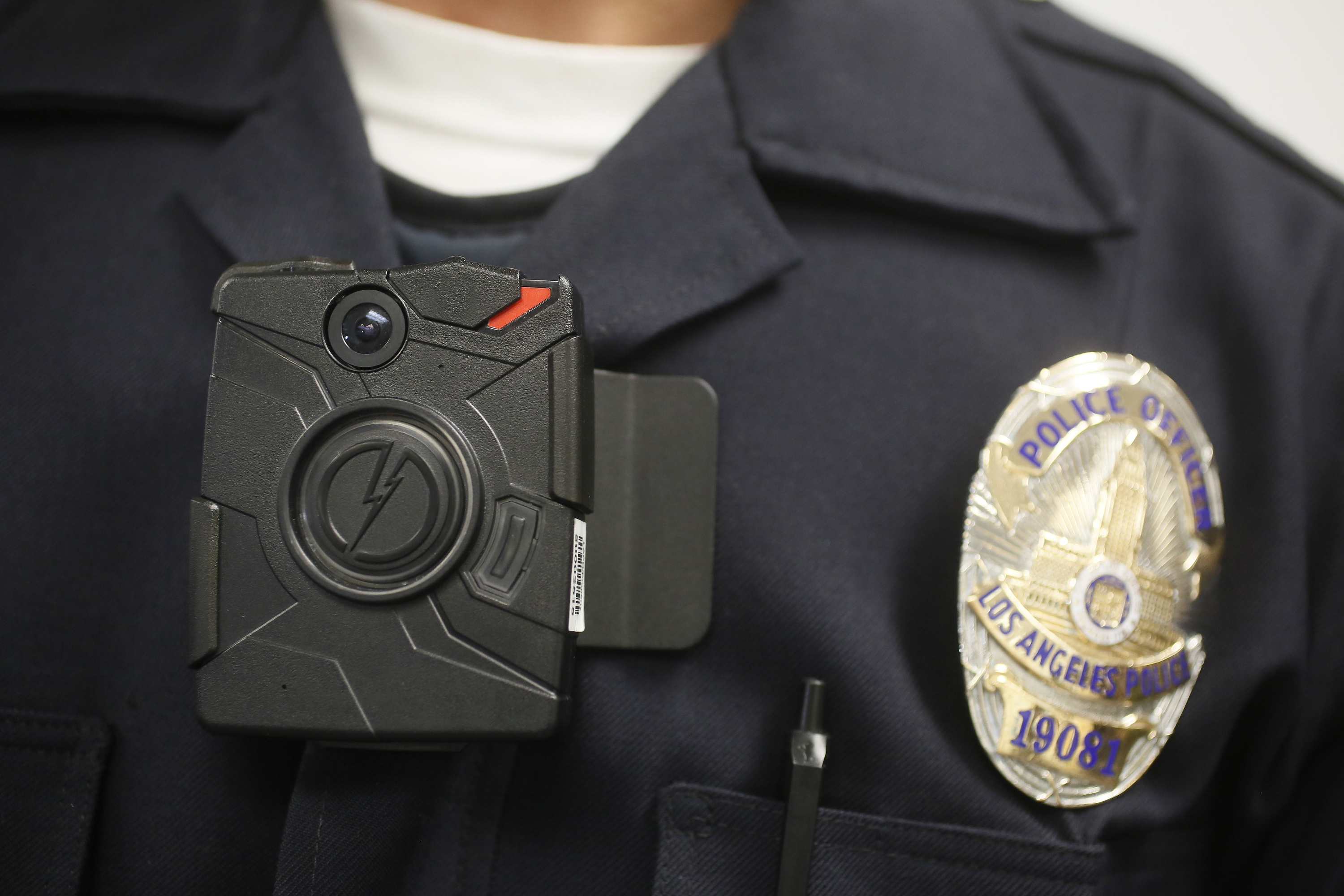Should Boston Police Officers Wear Body Cameras?

Image via Associated Press
A new online group that formed last week believes all Boston Police officers on the job should have to wear body cameras on their uniforms when responding to calls.
They have yet to Tweet, post a Facebook status, or even update their blog, but the mission of the “Boston Police Camera Action Team” seems clear: “to further accountability and safety in the city of Boston through the mandatory use of police body-cams.”
While little information about the “Action Team” is available at the moment, they provide insight about their alleged goals in a question-and-answer section of the website, including why they decided to start the group now.
“People wake up to reality and what’s happening in the world around them at their own time. For the ‘Boston Police Camera Action Team,’ we were all on one accord and felt that it was time to take action,” the group states. “Furious about past tragedies, our sympathy, sadness, anger, and the wanting to contribute toward a solution that will help prevent police brutality and violence is what brought us together. That is why we started the group.”
Attempts to reach the “Action Team” behind the website, Twitter account, and Facebook page calling for police to be strapped with video recording devices on their bodies were unsuccessful, but the idea behind the campaign mirrors similar actions being taken up by police departments in several major U.S. cities.
With the recent news out of Ferguson, Missouri, where last month an unarmed black teenager named Michael Brown was shot and killed by a police officer in the middle of the street, discussions about requiring the use of body cameras has become a topic of greater interest.
On Sunday, the New York Times ran an article titled “Today’s police put on a gun and a camera,” which detailed the emerging police trend, showing that more than a dozen departments across the country are gearing up to equip officers with the portable cameras. In New York City, 60 officers in high-crime districts will soon be testing cameras as part of a court-ordered pilot program. Departments in Florida, Arizona, Virginia, and Washington are also making use of wearable recording devices.
The article also pointed toward the success of camera use by officers in Rialto, California. A year after they were first introduced to the force, a 2013 study about the department’s body-camera program showed that both complaints from citizens in regards to an officer’s behavior, as well the use of police force, dropped significantly.
“When you put a camera on a police officer, they tend to behave a little better, follow the rules a little better,” Rialto Police Chief William Farrar said last year when the report came out. “And if a citizen knows the officer is wearing a camera, chances are the citizen will behave a little better.”
While it isn’t required yet in Massachusetts, officials from the Worcester Police Department said they are “reviewing whether the use of cameras would be a good addition” to the force in order to insure public safety, according to the Worcester Telegram.
In September of last year, at the Police Innovations Conference in Kendall Square, which was hosted by WiredBlue, officers from dozens of municipalities in Massachusetts came together to discuss emerging technological trends, including wearable cameras.
Taser, a company that makes the AXON body on-officer video camera, pictured above, told police at the event that when tested, officer complaints dropped by 90%, removing questions about why police acted a certain way when on duty.
Similarly, dozens of departments across the Commonwealth have become curious about the idea of making Google Glass part of their everyday interactions with constituents, but that concept would be less about recording situations, and more about utilizing apps integrated within the wearable technology, like those that support voice commands and visual aids.
In general, the argument about whether or not the use of body-cameras on police officers is beneficial has been greatly divided.
The debate has mostly centered on when it’s appropriate for police to have the cameras turned on, the high potential for violations of privacy when officers respond to certain calls, and how long footage recorded by the mobile devices should be stored by departments and who should be able to view it.
The American Civil Liberties Union raised some of these issues in a recent article, but concluded that with the right policies in place, to make certain that citizens’ rights aren’t being violated, the use of body cameras by police departments is a “win for all.”
“Although we generally take a dim view of the proliferation of surveillance cameras in American life, police on-body cameras are different because of their potential to serve as a check against the abuse of power by police officers,” the ACLU wrote in a short paper about the subject. “We’re against pervasive government surveillance, but when cameras primarily serve the function of allowing public monitoring of the government instead of the other way around, we generally regard that as a good thing.”
The ACLU’s stance on the issue reflects the goal of the “Action Team’s.”
“Video is powerful proof of what actually occurs during these interactions. Whether a police officer uses excessive force or responds to a legitimate threat, the bodycam records it all. Should a case end up in court, these recordings are tools for lawyers, who can use them both to defend innocent clients and prosecute guilty ones,” the group wrote.
Boston reached out to the Boston Police Department and the Boston Police Patrolmen’s Association, the organization that represents the city’s officers, to ask about the potential use of body-cams, and whether or not it’s being considered, but did not immediately receive a reply.


